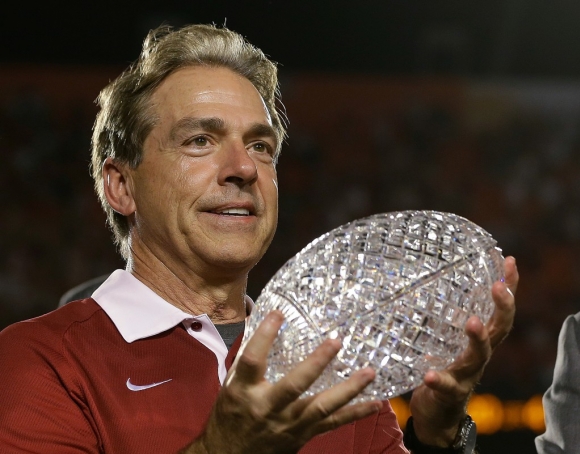Why College Football Recruiting Is Important
Published on 7-Feb-2014 by Stacey Mickles
Share this article

To the casual college football fan, National Signing Day is just another Wednesday in February.
But if you follow college football as closely as my colleagues and I do, you know how important yesterday was.
The first Wednesday in February is obviously a factor determining the future of your college football team and its coach. This year's class and the classes before it comprise the raw material for a possible national championship down the road.
Although sportswriterslike John Feinstein like to poo poo recruiting, it's important. Don't ask Feinstein, ask Nick Saban.
Alabama's head coach has had the No 1 recruiting class in the country three of the last four years, and know what that translated to? National championships.
Ask Mike Leach, now attempting to reverse recent fortunes at Washington State. He sends his staff far and wide -- and often down South -- searching for diamonds in the rough. Then there's Les Miles at LSU, who joins many of his colleagues in trying to build a fence around his state and filling in where he can with national talent. Newly hired coaches like James Franklin -- from Vanderbilt to Penn State -- try to bring the best of their commitments with them. It's a common occurrence, and a result of personal bonds recruits build with the coaches instead of the schools.
To this day, Lee Corso believes he was every bit the coach that Michigan's storied Bo Schembechler was, and most of his contemporaries agree. He just couldn't attract the athletes Schembechler could. And he paid for it.
Recruiting the right prospects matters. Ask former Auburn head coach Tommy Tuberville. Toward the end of his tenure down on the plains, Tuberville was not attracting four- and five-star recruits. Not that Auburn wasn't getting talent -- they were -- they just weren't getting NFL-type talent.
Saban mopped the floor with Tuberville his first year recruiting in Tuscaloosa, and by his second season at Alabama, he was competing for an SEC title and and national championship; Tuberville, on the other hand, was fired.
One of the reasons Mack Brown is no longer at Texas is because he missed out on three Heisman Trophy winners in his own state. Robert Griffin III and Johnny Manziel propelled their schools to a high-profile status. Jameis Winston apparently fell between the cracks; he wanted a school with strong football and baseball programs. Texas filled the bill, but it was Florida State who answered the phone. They're still saying thank you as Winston -- fresh from a decent showing last fall -- prepared to be the Seminoles' closer. And that's how Charlie Strong got to Texas.
And recruiting doesn't matter?
Yes, it's become a cottage industry, which is why some of the naysayers think recruiting has been overhyped and monetized:
And yes, college football recruiting is bigger in the South than anywhere else. Some academics claim it hastened the acceptance of integration, pointing to Alabama's refusal to admit African-Americans until legendary Crimson Tide coach Paul 'Bear' Bryant added his voice to those making an issue of it. When his undefeated 1966 team was overlooked for the national title, the Bear famously commented, “Alabama lost the title that year because of George Wallace.”
He made his point four seasons later by scheduling an integrated USC team, a move at the time that only someone of his stature could attempt. Ironically, it was the Trojans' recruiting success in the South that Bryant wanted to feature. It was effective.
Recruiting is an imperfect process, but studies have shown that a school's facilities weigh heavily in a player's decision. The resultant arms race for bigger and better physical plants has cost millions upon millions of dollars. Do you think athletic departments would commit to keeping up with the competition if recruiting wasn't important?
Is there too much pressure put on the young men being recruited? Probably. But that's part of the game, most seem to enjoy it, and for many, it's their best opportunity to enter the world of higher education.
So, it's important to them, too.

